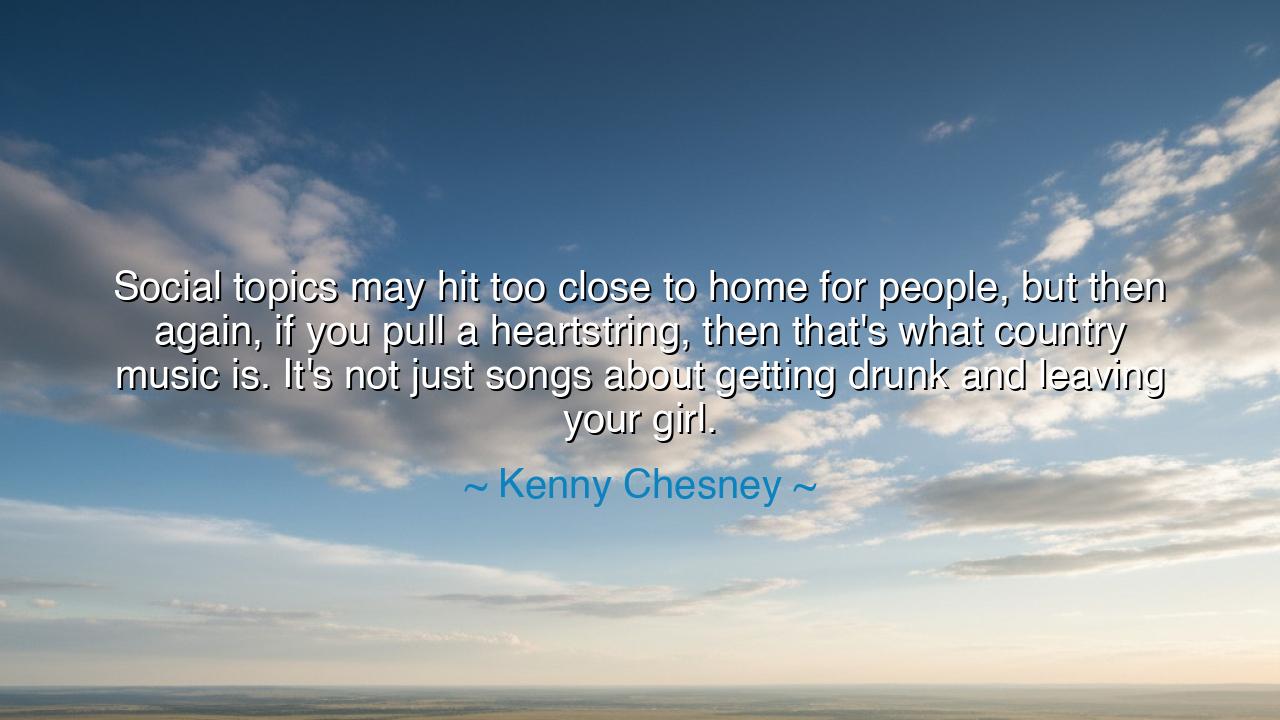
Social topics may hit too close to home for people, but then
Social topics may hit too close to home for people, but then again, if you pull a heartstring, then that's what country music is. It's not just songs about getting drunk and leaving your girl.






“Social topics may hit too close to home for people, but then again, if you pull a heartstring, then that's what country music is. It's not just songs about getting drunk and leaving your girl.” Thus spoke Kenny Chesney, a bard of the modern age whose voice, like the winds over the plains, carries both laughter and lament. In these words lies the essence of art, truth, and the eternal purpose of music itself: to touch the soul, to stir what is buried deep, and to remind humankind of its shared humanity. Chesney reminds us that true art does not exist merely to entertain, but to awaken; that country music, born of earth and struggle, speaks not just of broken love, but of the great and tender pulse of life itself.
For in every age, the songs of the people have been their scripture. The shepherds of ancient Israel sang of sorrow and deliverance in their psalms. The bards of Greece told of longing and loss through their lyres. And in the fields of America’s South, the humble chords of the banjo and guitar gave rise to the country song, a new hymn of endurance and truth. It was never merely about joy or heartbreak—it was about life as it is, in its full, aching beauty. To “pull a heartstring,” as Chesney says, is to touch the place within the listener where truth and emotion meet, where laughter may turn to tears and back again.
But there are those who fear the truth. “Social topics may hit too close to home,” he says—and indeed, they do. The world often resists the mirror that art holds up to it. To sing of hardship, injustice, or the quiet pain of loneliness is to risk unsettling the peace of those who would rather look away. Yet the artist’s duty, as known since the time of the poets, is not to comfort but to reveal. The Roman philosopher Seneca wrote that words should not soothe like soft music, but pierce like thunder when truth demands it. So too does Chesney remind us that when a song stirs the conscience, when it makes us weep for what is wrong or long for what is lost—it is fulfilling its highest purpose.
Consider the story of Woody Guthrie, who sang for the poor and the displaced during the Great Depression. His songs, like “This Land Is Your Land,” were not written to please the powerful but to give voice to the voiceless. Many turned away, for his melodies told of hunger and struggle, but they also reminded listeners of hope—that even amid dust and despair, the human heart still sings. Chesney stands in this same lineage: the troubadour who dares to touch pain, to speak the unspeakable, and in doing so, to heal. For when the heart is moved, it begins to open—and from that opening, compassion is born.
Yet, as Chesney says, country music is not all sorrow and sin. It is not confined to tales of whiskey and heartbreak. Those are but symbols, fragments of a greater tapestry—the story of ordinary lives, of the laughter that follows loss, of redemption found at the end of a long road. In every true country song lies the echo of the human condition, a harmony between joy and grief, hope and resignation. The man who drinks does so to forget his pain; the woman who leaves does so to find her peace. Behind the melody lies the eternal rhythm of life—the cycle of falling and rising, of loving and learning, of hurting and healing.
Thus, we see that Chesney’s words speak not only of music but of courage—the courage to feel deeply in an age that often fears emotion. To “pull a heartstring” is to risk vulnerability, both as artist and listener. But it is only through such openness that understanding can flourish. A song that dares to weep for the world can teach it to love again. The musician becomes a kind of seer, one who translates silence into sound, and pain into beauty. His gift is not entertainment—it is empathy.
So let this be your lesson, O listener of the future: whether you are a singer or not, live your life like a true musician. Speak the truth even when it trembles. Pull at heartstrings—your own and others’—for in that tenderness lies the strength of humanity. Do not shy away from the songs that “hit too close to home,” for they are the ones that awaken the heart from its sleep. And when you encounter sorrow, turn it into song, as all wise souls before you have done. For as Kenny Chesney reminds us, to feel deeply and to share that feeling is the noblest kind of music—and that is something anyone can play.






AAdministratorAdministrator
Welcome, honored guests. Please leave a comment, we will respond soon